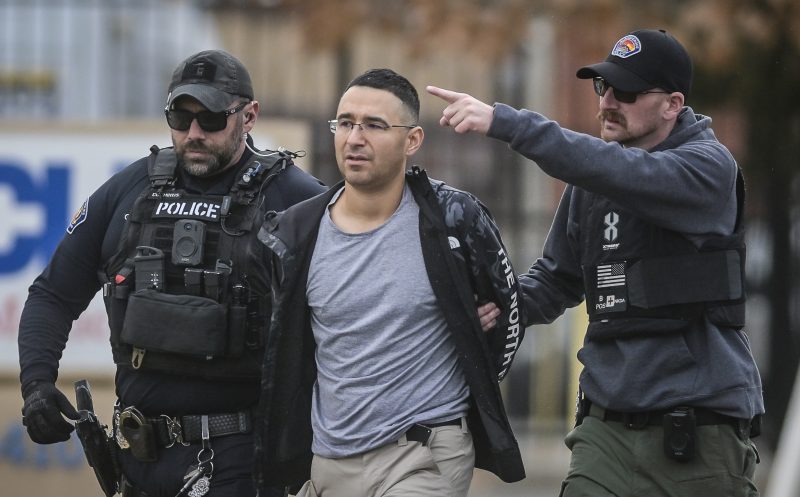The arrest of a defeated candidate for the New Mexico legislature on charges that he orchestrated a plot to shoot up the homes of four Democratic officials in Albuquerque prompted widespread condemnation Tuesday as well as accusations that the stolen-election rhetoric among supporters of former president Donald Trump continues to incite violence.
Following the Monday arrest, new details emerged Tuesday about the alleged conspiracy, including how close a spray of bullets came to the sleeping 10-year-old daughter of a state senator. Albuquerque police said in charging documents released Tuesday that Solomon Peña, 39, who lost a state House seat in November by a nearly 2-1 margin but complained that his defeat was rigged, hatched the plot. Police accused him of conspiring with four accomplices to drive past the officials’ homes and fire at them.
Peña “provided firearms and cash payments and personally participated in at least one shooting,” the documents said. They alleged he intended to cause “serious injury or death” to the people inside their homes, the documents said. The group allegedly stole at least two cars used in the incidents, police said.
One of the targets of the attack said the shootings were part of a lineage of violence that stems from Trump’s false claims of a stolen election and that includes the Jan. 6, 2021, attack on the U.S. Capitol.
“You think it wouldn’t happen here, that someone would do this to local officials,” said former Bernalillo commissioner Debbie O’Malley, whose home was shot at Dec. 11. “There’s been this narrative for a long time: If you don’t get your way, it’s okay to be violent. The message came from the top. It came from Trump.”
Peña faces a raft of charges including four counts of shooting into an occupied dwelling, four counts of shooting at or from a motor vehicle, four counts of conspiracy, possessing a firearm with a felony conviction, attempted aggravated battery with a deadly weapon and criminal solicitation.
According to the charging documents, the most recent incident occurred Jan. 3, when at least a dozen rounds were fired into the Albuquerque home of state Sen. Linda Lopez (D).
Lopez told police she had initially thought the loud bangs she heard just after midnight were fireworks. But in the middle of the night, her 10-year-old daughter awoke thinking a spider had crawled across her face and wondering why her bed felt like it was filled with sand.
At daybreak, Lopez noticed holes in the house that made her suspect gunfire. After realizing that it was drywall dust from bullet holes that had awakened her daughter, she called the authorities, according to the charging papers. The documents also allege that Peña personally participated in the Lopez shooting because he was displeased that prior shootings had aimed “so high up on the walls.”
Peña brought an automatic rifle to Lopez’s home, but it jammed during the incident and did not fire, according to the documents.
Police accused Peña of orchestrating similar attacks in December on the Albuquerque homes of New Mexico state Rep. Javier Martinez, Bernalillo County Commissioner Adriann Barboa and O’Malley, who at the time was also a county commissioner. They did not say whether the gunfire at those homes came close to striking anyone. Lopez, Martinez and Barboa could not be reached for comment.
Before his run for office, Peña served nearly seven years in prison on convictions related to a smash-and-grab scheme that included burglary, larceny and contributing to the delinquency of a minor. Democrats had sought unsuccessfully in court to have him removed from the ballot, citing his record of felonies.
In an interview, Albuquerque Police Chief Harold Medina said he has no doubt that Peña was motivated by Trump’s false claims of election fraud following the former president’s 2020 defeat. Medina said Peña regularly expressed extreme views on social media and boasted of attending Trump’s Stop the Steal rally in Washington on Jan. 6, 2021.
“The individual that we’re charging believed in that conspiracy,” Medina said. “He did believe that his election was unfair and he did escalate and resort to violence as a means to find justice.”
Medina said federal law enforcement is also investigating potential federal firearms violations related to the shootings, as well as whether Peña participated in the Jan. 6 riots. An FBI spokesman said the agency is assisting local authorities in their investigation and declined to comment further.
Trump spokesman Steven Cheung called it “appalling that some people would use this tragedy to try to score cheap political points. President Trump had nothing to do with this and any assertion otherwise is totally reprehensible.”
Lawyers for Peña and two of his alleged co-conspirators, Demitrio Trujillo and Jose Trujillo, could not be reached for comment.
Albuquerque Mayor Tim Keller (D) said Peña visited all four targets’ homes in the days leading up to the attacks, seeking to persuade them that the result of his election had been rigged. “What’s absolutely disturbing and terrifying is that he went from that to literally contracting felons who were out on warrant to shoot up their houses,” Keller said. “That’s the leap he took within a matter of days.”
Keller said it is not clear why Peña did not target his opponent, Democratic state Rep. Miguel Garcia. He said police have collected an overwhelming amount of evidence, including shell casings found at the crime scenes and in the recovered stolen vehicles as well as texted instructions, including the targets’ addresses, from Peña to his alleged co-conspirators.
Colorado Secretary of State Jena Griswold, an outspoken critic of the threatening rhetoric of election deniers and a target of frequent online attacks, called on Republicans to condemn the violence in Albuquerque and urged voters to reject candidates who don’t.
She cited the plot to kidnap Michigan Gov. Gretchen Whitmer as well as the more recent attack on Paul Pelosi, former House speaker Nancy Pelosi’s husband, as other troubling recent examples of political violence.
“It’s horrific,” Griswold said. “There are so many people who have to look over their shoulder living in fear in an atmosphere of political violence. As a nation we’re just lucky that the bullets didn’t land.”
Some Republicans joined in the condemnations. Ryan Lane, the New Mexico House Republican leader, praised law enforcement for their quick investigation. “New Mexico House Republicans condemn violence in any form and are grateful no one was injured,” Lane said.
The Republican Party of New Mexico issued a statement late Tuesday that made no mention of Peña’s candidacy or his denial of election results, but said the accusations against him “are serious, and he should be held accountable if the charges are validated in court.”
The incident also prompted a new push for gun control. In Santa Fe, New Mexico Gov. Michelle Lujan Grisham (D) called for a ban on assault weapons in an address to the state legislature on the first day of its 2023 session. “There are elected officials in this room today whose homes were shot at in despicable acts of political violence,” she said.
Peña allegedly conspired with four other men, according to the charging documents, hatching a plan to steal cars to use during the attacks and then abandon them. Subsequent investigations of stolen vehicles found with matching shell casings appear to confirm that plan, the police said.
Police said they examined the cellphone of one of the alleged co-conspirators, Demitrio Trujillo, and found that Peña had sent him the addresses of the targets, and that Trujillo had then searched for the addresses on his phone.
Peña started organizing the shootings soon after the election, according to the police report. On Nov. 12, he texted Barboa’s address to Trujillo. A week and a half later, Peña texted Trujillo a passage from an unknown book.
“It was only the additional incentive of a threat of civil war that empowered a president to complete the reformist project,” the text read.
On Dec. 8, Peña sent the address of Martinez, whose home was attacked that night, and that of O’Malley. The texts between Peña and Trujillo contained plans to meet in parking lots, stores and fast food restaurants, according to the police report.
The charging documents also recounted the recollections of an unnamed confidential informant who said that Peña was not happy that the shootings would take place late at night, when they were less likely to injury anyone.
“Solomon wanted the shootings to be more aggressive” and “wanted them to aim lower and shoot around 8PM because occupants would more likely not be laying down,” according to the documents.
According to the documents, Jose Trujillo was arrested less than an hour after the Lopez shooting and just a few miles away, after he was pulled over for an expired registration in a Nissan Maxima registered to Peña. In addition to two weapons found in the trunk, police found 800 pills believed to be counterfeit Oxycodone as well as cash. Police also discovered that Trujillo had a warrant out for his arrest.
Police said Peña paid his co-conspirators at least $500 for their roles.
O’Malley told The Washington Post that Peña visited her home on Nov. 10, days after he lost the election.
“He was agitated and aggressive and upset that he did not win,” O’Malley said. Peña told O’Malley that he had knocked on tons of doors across his district, which should have led to him winning more votes. She rebuffed his request that she sign a document alleging the election was fraudulent, so he left.
A week later, on Dec. 11, a loud pop — “like a fist just banging on our front door,” she said — woke up her and her husband. There were four more bangs. “Oh my goodness, gunshots,” she remembered thinking.
No one was injured, but 12 shots were fired at her house. O’Malley said that because her grandchildren often sleep over, she now worries what could have happened if they had been there. She said she also worries about what the attacks mean for democracy.
“Someone has threatened my home and feels that it’s okay to shoot at my home where my family is because they didn’t get their way,” she said. “I absolutely blame election denialism and Trump. I couldn’t tell you what the solution is.”
Devlin Barrett, Isaac Arnsdorf and Alice Crites contributed to this report.








